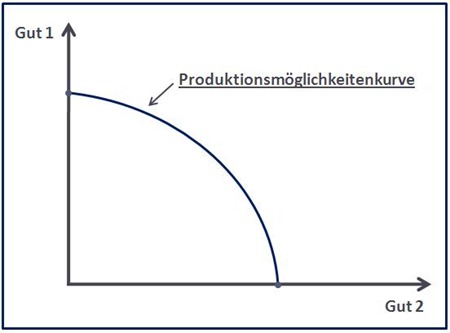Posts tagged IB Eco Introduction
Introduction to Economics Part 2 – Production Possibility Frontiers (or PPFs)
Aug 23rd
[Source: http://commons.wikimedia.org/wiki/File:WikiAbb1_1.JPG]
These can sometimes be referred to as Production Possibility Curves (PPCs), to reflect their shape. Frontier is a better word to use … you will need to think about what it is that the term frontier implies.
This session assumes you have a basic knowledge of PPFs already and points you to resources to help strengthen your understanding of this important concept.
This link is very good for explaining
a) the reason that the PPF is a curve and not a straight line
b) how opportunity cost increases as an economy tends to specialise in one of the two goods
http://tutor2u.net/economics/content/topics/introduction/ppfs.htm
If you feel that you need to understand these concepts even further, read the following link. Note that this introduces the idea of an outward shift of the PPF. You can ignore section C which we look at later in the course (especially Higher Level candidates)
http://www.investopedia.com/university/economics/economics2.asp
The concept of increasing opportunity cost is shown very visually here:
http://itc.boisestate.edu/mediashowcase/media/prodpossfron_audio.swf
… and this animation also emphasises outwards shift – two scenarios are given – what is the difference between them?
http://webcom2.grtxle.com/Source/uploads/Economics1.swf
You should now be in a position to work through the questions associated with the interactive PPF on the website below:
http://highered.mcgraw-hill.com/sites/007334365x/student_view0/chapter2/interactive_graph_2.html
Finally, it could be worth recapping these concepts by visiting the video links below:
1) pajholden explains the PPF on youtube:
Production Possibility Frontiers by Paul Holden
2) Another human explanation:
See it in full: http://blip.tv/play/AceTJY6iSw
Finally – what assumptions does the PPF make? Try and list as many as possible and then consider how realistic these assumptions are – given reasons or examples as to why they may be unrealistic.
Introduction to Economics Part 1
Aug 23rd
In this section we consider the following concepts as outlined in the IB Economics Syllabus [© International Baccalaureate Organization, 2003] :
Scarcity
• factors of production: land, labour, capital and management/entrepreneurship
• payments to factors of production: rent, wages, interest, profit (we cover this later on in the course)
Choice
• utility: basic definition
• opportunity cost
• free and economic goods’
What do we mean by scarcity? First we need to know what we mean by needs and wants. These are easy concepts to understand …
Need more on this? …
Having watched the clips, make sure you can define needs and wants. It is always good to have examples as well as definitions.
Now we move on …
This excellent YouTube clip gives us an animated explanation of the concept of scarcity, while referring to Labo[u]r, Raw Materials and Capital. We need to be able to define these three things. Note that Raw Materials is often referred to as Land within Economics.
It is important to be able to give definitions for these three resources (or ‘factors of production’) – land, labour and capital. You should also be able to define a fourth – entrepreneurship (commonly referred to as enterprise’). Use this next YouTube clip to check your understanding of these:
This next YouTube clip develops the concept of scarcity and concentrates on how scarcity means that choices have to be made – this is essentially what economics is all about. (Note – it introduces some ideas that we will return to in more detail in a later section). Watch it and use it to define and give examples of the main concepts which are referred to as such as wants, economic goods, free goods.
The summary below helps us understand the above ideas, and leads us onto the concept of Opportunity Cost.
[Taken from http://www.businessstudiesonline.co.uk]
So what is Opportunity Cost?
Opportunity Cost – "the value of the next best alternative forgone as the result of making a decision" [see wikipedia for fuller information]
So what do we mean by ‘next best’? This YouTube clip exemplifies:
This light-hearted YouTube clip demonstrates that it need not be about money, but that cost in this sense can be measured in time:
This YouTube video underlines the concept even further, and considers among other things, the opportunity cost of surfing the web.
It is clear that we have to be able to value the things that we choose to do/make/consume and the things we choose to forego. The money value of an opportunity cost can actually get very complicated. Try this activity:
You can see from this interactive image below that we have explored two of the basic economic principles in this section:
The 6 Core Economic Principles
(thanks to http://www.kidseconposters.com)
By the end of this section you should be able to define and illustrate with examples the following key phrases:
Introduction to Economics Part 3 – Utility and Rational Versus Irrational Behaviour
Aug 23rd
Money can help us place a value on things, but the underlying value of things can be explained by the concept of utility. This podcast explains:
We are now beginning to consider some of the fundamental assumptions which are central to the ‘science’ of Economics. We should already understand that utility is a key idea, yet also a very vague term when one we consider how subjective this idea is.
Another key assumption of mainstream Economics is that people behave in a rational way. Remember the 6 Principles:
The 6 Core Economic Principles
(thanks to http://www.kidseconposters.com)
Look at principle 3. This assumes rational responses to a given situation.
Yet is this always the case?
The excellent TED Talks website has a number of interesting presentations that argue that we as humans do not always behave rationally. These arguments come from various connected disciplines (or subjects) such as behavioural economics and pyschology. It is worth knowing these more recent theories which seem to contradict the long standing assumption that we behave rationally. Note, if you study Theory of Knowledge, these arguments are really useful for when you study Reason as a Way of Knowing but also the Human Sciences as an area of Knowledge.
![]() Suggested learning activity, if you are studying as part of a group. Divide yourselves up so that you take one of the following videos each (or as pairs, threes, whatever). Watch your chosen video and prepare a short summary (max 300 words) of the messages which are relevant to your studies of Economics, and be prepared to share your summary with the others in your group.
Suggested learning activity, if you are studying as part of a group. Divide yourselves up so that you take one of the following videos each (or as pairs, threes, whatever). Watch your chosen video and prepare a short summary (max 300 words) of the messages which are relevant to your studies of Economics, and be prepared to share your summary with the others in your group.
Note – the title above each video embedded below gives a direct link to the video. From the direct link you could download each video to your iPod / iPhone, for example.
Dan Ariely asks, Are we in control of our own decisions?
Daniel Kahneman: The riddle of experience vs. memory
Dan Ariely on our buggy moral code
Laurie Santos: A monkey economy as irrational as ours
Dan Gilbert on our mistaken expectations
Transition Economies
Oct 7th
[Source: flickr.com Image by sludgegulper Some rights reserved]
According to the International Monetary Fund (2000) the following economies can be categorised as making the transition from command to free market economies in recent history.
Transition economies in Europe and the former Soviet Union
CEE
Albania, Bulgaria, Croatia, Czech Republic, FYR Macedonia, Hungary, Poland, Romania, Slovak Republic, SloveniaBaltics
Estonia, Latvia, LithuaniaCIS
Armenia, Azerbaijan, Belarus, Georgia, Kazakhstan, Kyrgyz Republic, Moldova, Russia, Tajikistan, Turkmenistan, Ukraine, UzbekistanTransition economies in Asia
Cambodia, China, Laos, Vietnam
Source: Transition Economies: An IMF Perspective on Progress and Prospects (2000)
Use your text book and the web to find out what a transition economy is in theory. Then, having selected one of the above, work in a pair to research a real life transition economy. Your 3 specific goals are to:
1) Evaluate how well the economy fits the general theory behind transition economies. Make sure you use headings from the theory to structure this aspect of your research.
2) Evaluate the impact of the transition on different stakeholders (groups of people) – for example: firms, low income groups, high income groups, other nations, the government.
3) Evaluate the transition in terms of both the short term and long term consequences on that economy.
A very tongue-in-cheek comic take on transition economies can be seen here:
Market Economies
Sep 30th
[Source: flickr.com Image by Concrete Forms Some rights reserved]
All economies need to answer the three basic questions which result from the fact of scarcity:
- What to produce
- How to produce
- For whom to produce
For a market economy, we need to research the following:
a) How it works – how does it answer the three basic questions above?
b) Advantages of this economic system
c) Disadvantages of this economic system
d) Examples covering the three above points
Note: It is important to be able to compare this economic system to that of command (or planned) economies (– see previous post).
Some useful ’starting point’ web sites follow:
Economywatch.com on Market Economies (possibly sourced from elsewhere)
The Free Dictionary on Market Economy
‘Market Economy Totally Explained’
Is a free market "free" if it’s regulated? (How Stuff Works)
A video on Free Market Economies can be viewed here (source: videos.howstuffworks.com)
From the same site, a video comparing market economies to command economies.
Command (or Planned) Economies
Sep 23rd

Image by bobster855 (flickr.com Some rights reserved )
All economies need to answer the three basic questions which result from the fact of scarcity:
- What to produce
- How to produce
- For whom to produce
For a planned economy, we need to research the following:
a) How it works – how does it answer the three basic questions above?
b) Advantages of this economic system
c) Disadvantages of this economic system
d) Examples covering the three above points
Some useful ‘starting point’ web sites follow:
Wikipedia on Planned Economies
enotes.com on Planned Economies
Fact Archive on Planned Economies (probably from various sources)
BBC News on North Korea (one of the last planned economies?)





